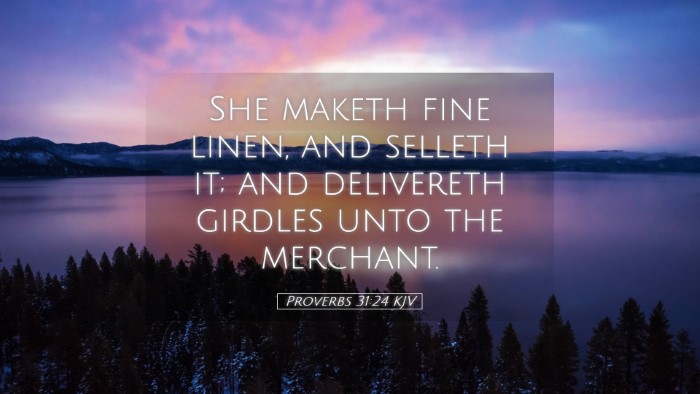Commentary on Proverbs 31:24
Verse: "She maketh fine linen, and selleth it; and delivereth girdles unto the merchant."
Introduction
This verse forms part of the well-known passage known as the "Virtuous Woman" in Proverbs 31. It serves as a testament to the industriousness and resourcefulness of a godly woman. Insights from various public domain commentaries will unfold the significance of her actions and the deeper implications of her character.
Matthew Henry's Commentary
Industry and Craft: Matthew Henry emphasizes the virtuous woman's industrious nature. Her ability to make fine linen indicates both skill and diligence. In the context of her family and community, this reflects her commitment to provide for those she loves.
Business Acumen: The act of selling linen and delivering girdles to merchants showcases her ability to engage with the marketplace. Henry notes that her involvement in trade is a symbol of her competence and shrewdness, suggesting that a virtuous woman is also prudent in financial matters.
Spiritual Implications: Furthermore, Henry correlates this industriousness with spiritual vitality. He remarks that the woman’s work is a reflection of her faithfulness to God’s calling, merging the spiritual with the practical. This serves as a reminder to all believers about the integration of faith and daily responsibilities.
Albert Barnes’ Notes
Cultural Context: Albert Barnes provides insight into the cultural significance of linen in biblical times. Linen was a valuable commodity, representing purity and refinement. By making fine linen, the woman not only contributes materially but empowers herself socially and economically.
Entrepreneurship: Barnes highlights this verse as a commendation of female entrepreneurship. He posits that her actions break stereotypes of women solely as homemakers. Instead, she embodies a model of a woman who influences the economy, thereby encouraging modern readers to appreciate the roles that women can play beyond traditional expectations.
Role in Society: Additionally, Barnes connects her actions with a reasoned balance between domestic life and external vocation. He portrays the virtuous woman as one who maintains her household while simultaneously engaging in profitable activities that benefit her family and community.
Adam Clarke's Commentary
Hyperbole of Virtue: Adam Clarke interprets this verse within a broader narrative of exaggeration common in Hebrew poetry to illustrate the ideal woman. He notes that the portrayal of the virtuous woman is aspirational and sets high standards for women, yet presents a model of strength and capability.
Symbolism of Girdles: Clarke elaborates on the girdles, which hold practical and symbolic meanings. In ancient times, girdles were often made of fine materials and indicated status. By delivering girdles to merchants, the woman signifies her role in social elevation and her keen understanding of material Value.
Spiritual Symbolism: Clarke further argues for a reading that views the girdles as indicative of spiritual readiness. Just as a girdle was used to bind and prepare for work, this action could symbolize the believer's preparation for righteous deeds and service in God’s kingdom.
Application to Modern Readers
The insights gathered from these commentaries serve as essential guidance for contemporary readers, especially pastors, students, and theologians.
-
Valuing the Contributions of Women: The industriousness and capabilities of women as depicted in this verse encourages recognizing and valuing the contributions women make in family and society.
-
Integration of Faith and Work: The virtuous woman's ability to balance her domestic responsibilities with market activities serves as a reminder that all work can be a form of worship and an expression of faith.
-
Encouraging Entrepreneurship: The virtues of resourcefulness, creativity, and entrepreneurial spirit portrayed by the woman inspire modern believers to embrace economic responsibility and ingenuity.
-
Spiritual Readiness: Just as the girdle symbolizes preparation for action, readers should consider how they are equipping themselves spiritually for the work God has called them to.
Conclusion
Proverbs 31:24 offers a multifaceted view of a virtuous woman who excels in labor and entrepreneurship. Commentaries by Matthew Henry, Albert Barnes, and Adam Clarke illuminate her industrious spirit and societal contributions while calling readers to reflect on their roles and responsibilities. This verse stands not only as a commendation of women's work but as a timeless reminder of the integration of faith and action, underscoring the importance of both the spiritual and practical aspects of life.


